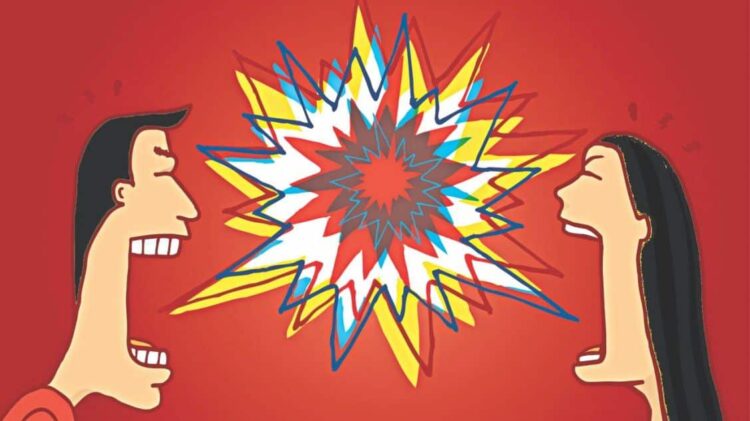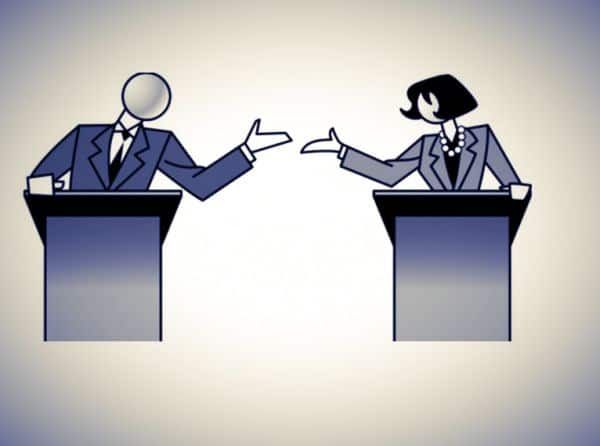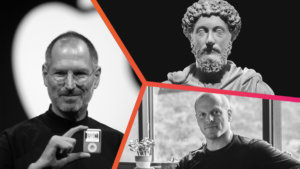The question of what is an argument is one of the most confusing questions in everyday life. The reason for this is that the discussion is coded in different ways by almost everyone. In fact, discussion is a scientific and academic concept. It would not be wrong to say that it is an effort and a method.
In the most general sense, it is the change of ideas of people and groups in front of a person or group. Argumentation is not only in the sense of changing and instilling ideas, but also the name given to the process of persuading ideas. It is a technique that has developed academically with modernization. However, the history of the debate goes back to the very ancient times of humanity.
This is because people argue with each other even before rational and logical thinking. Thus, we can say that the debate has been going on since the day people started to establish social relations with each other. Throughout our article, we will try to examine what the discussion, which has different examples and techniques, means. Argumentation means that academically opposing ideas pit against each other within certain conventions. However, discussion is also among the most frequently used communication methods in daily life.
The Place and Importance of Debate in Daily Life
Discussion is perhaps one of the basic building blocks of our daily life. Most people think of arguing as a situation that negatively affects social life. But let’s say that there is a deep gap between arguing and fighting. It is a practice that almost all of us resort to in our daily lives, albeit unintentionally. It is an indisputable fact that talking has a very close relationship with socializing.
That is why it is a social practice. There are certain differences between defending ideas on a near-fanatic level and defending one’s own ideas in a civilized way.
Perhaps one of the most dominant features of being a modern individual is to have one’s own ideas. Thus, discussion is essential both for the reorganization of social relations and for the health of the democratic order. Although it is a scientifically coded structure, it is among the most distinctive features of human relations. We all have specific codes by which we determine our own lives. Thanks to these codes, we direct various arguments to each other. Let’s get to know the argument briefly.
What is an Argument? What is the Importance of the Argument for the Debate?
The concept of argument is among the most fundamental moments of discussion. We can say that it is impossible to imagine a discussion without arguments. Every discussion needs arguments in this sense. We’ve all heard the definitions of false arguments, illogical arguments, or valid arguments. These are important for academic progress as well as for social relationships. Let us state that the concept of argument is as important as the question of what is an argument. Every discussion consists of contradictory arguments. Individuals or groups produce various arguments to persuade each other.
During a conversation, the people who make up the conversation chat with each other one after the other. During this conversation, almost everyone resorts to certain propositions. While some of these propositions are generalists, others refer to the specific situation. Thus, two important types of argument that make up the concept of argument emerge. Deduction and induction are two different methods of the concept of argument. While some arguments emphasize the general, others have a general to specific theme. The important point for the arguments is the overall accuracy. The argument can be invalidated if it is not completely true.
Why Should We Avoid Arguing? What is the Importance of Debate?
We’ve all heard comments like “don’t argue with me about this”, “I don’t want to argue with you” or “no need to argue”. These statements show how valuable the question of what is discussion is. This is because arguing is thought to be a verbal and physical fight. However, discussion is among the most important building blocks of personal and social development. Groups in which there is no civil and regular discussion between people stand out with the accumulation of problems.
We should not shy away from discussing and standing behind our ideas. Discussion is of great importance in order to reach a conclusion and a solution. Otherwise, differences of opinion may deepen and lead to bigger problems. Many people have a tendency to think of discussion as a beat-and-beat structure. From this perspective, this is true, but with a major flaw. Being open to new ideas is among the most valuable qualities of personal and social virtue. Discussions conducted with logical reasoning help to eliminate various mistakes. In this direction, it is very critical to defend the debate and the culture of discussion.
What Should Be Considered During the Discussion?
Although the question of what is a discussion is important, it has issues that need attention. If certain rules are not followed during the discussion, a civilized discussion will not occur. In this sense, the concept of discussion also has an orderly position. Many concepts such as style, language, tone of voice, gestures and facial expressions are important for discussion. Beyond all this is the control of emotions. A discussion where emotions cannot be controlled can easily cease to be a discussion. Every person has various emotions. These feelings give us certain belongings and beliefs.
During the discussion we should not think that anything is entirely related to us. If we think like this, we can very simply come under the control of our emotions. This can lead us to not understand the person and people in front of us correctly. The same is, of course, mutually valid for individuals and groups conducting the discussion. It is necessary to act without forgetting that every idea is valuable and defended by people. If this is not done, the people in front of us can activate their emotions. In the discussion, ridicule and insulting expressions should be avoided in every sense.
How Many Types of Discussions Are Separated? What Do They Mean?
The concept of discussion can appear in academic life as well as in daily life. We can move on to another important topic as much as the discussion title. The concept of discussion has undergone various transformations throughout history and has given birth to certain types. These species occur on the condition that they are carried out by individuals and groups. Each has its own characteristics and rules that must be followed. The most common types of scientific and academic discussion are as follows; panel, panel, symposium, debate and forum. We can now begin to examine these types of arguments in turn.
1) Open Session
Public debate is among the most common types of academic discussion. It is also known for being the first thing that comes to mind when it comes to discussion. Discussions in media such as radio and television are usually open sessions. Issues that are closely related to the majority of the society are examined under the title of open session. A topic determined in the open session is discussed in depth by the experts of the subject. Meanwhile, the experts who defend the determined issue and those who stand against them draw attention. The order here is provided by the chairperson who directs and conducts the open session. The chairperson advances this orientation by giving the floor to the speakers, the participants, respectively.
Open sessions can involve listeners or can be done without listeners. It can be recorded as well as performed live in front of the audience. Speaker, the number of participants usually varies between 3-6. After the panel starts, the chairperson invites and introduces the participants. Then the subject is determined and the first comments are made on it and the open session begins. There are basic features that a panel chair should have. The most important of these features is the chairman’s expertise on the subject.
2) Symposium – Information Fest
The symposium is also known as the information feast. The main reason for this is that there are participants who speak freely about a topic. Symposiums are usually conducted on academic and scientific topics. Similar to the panel discussion, there is a chairperson who also drags the symposiums. The difference from open sessions is that they are conducted on more serious issues. A determined subject is approached from different aspects. At a symposium on the water crisis in Turkey, each participant makes presentations on their area of expertise. These presentations can be as information sharing or they can be carried out in the form of discussions respectively.
The rationale for discussion in symposiums is the sharing of ideas. Thoughts on the subject are shared among the participants. The goal is to uncover new ideas rather than persuasion. The publication of a final statement is the hallmark of the symposia. The number of speakers can vary between 3-6 and the final statement is read to the audience. With this feature, it draws attention as an example of solution-oriented discussion. Symposiums can last for a few days, as well as for a short time. The important thing here is the subject and the length of the subject. The symposium is often held at universities.
3) Debate
Debates are examples of debates marked by juries and opening sentences. Debate is interesting in that it is an interesting example of our discussion title. The reason for this is that everything in the debates is carried out within a certain control. The jury and the participants must pay attention to these rules. It is conducted between two groups with different views. One of these groups has to read the opening sentence. The group with the opposing view begins the debate by presenting the antithesis of the view. There is a jury that oversees this entire process. Possible violations are checked by the jury.
The number of group participants can vary between 2-4. Each group must elect a spokesperson or chairman. Under these conditions, the debate begins. Unlike the panel discussion, group spokespersons introduce instead of the debating chair. Group members and spokespersons play a major role. After this process, group stakeholders give their opinions one by one. Then the debate ends with the defense of the group spokesperson. The task of the jury is to evaluate the presentations and opinions. After this process, the winner is announced.
4) Panel
We continue our topic of discussion with a panel. Among the examples of panel discussion, it is one of the most relaxed and conversational. Subject matter experts share their views on a sensitive issue of public concern. The difference between the panel and the symposium is that the process is quite comfortable and flexible. Still, there is a close relationship between panels and panels. The simplest way to distinguish between the two examples of arguments is the attitudes and style. Panels consist of more relaxed conversations about lighter topics than open sessions. Another difference is to avoid reaching a definite opinion on the subject.
It is enough to speculate on the panels. Instead of producing solutions on the subject, it is aimed to prove the existence of different ideas. People called the chair, executive or facilitator lead the panel. The number of panel participants is between 3-6. Speakers are expected to share different views on this issue. It is essential that they do this within the time allotted to them. At the end of the panels, the audience can participate in the panel. They can pose questions to the participants and explain their own ideas. In this case, the conversion of the panel to the forum takes place.
5) Forum – Public Arena
Forum also means public arena. This is because it is the most public of all types of discussion. At the end of the panel, we said that it turned into a forum with the participation of the audience with their questions. The forum doesn’t just come across like this. The forum is a type of discussion that can be prepared on its own. A forum can be organized with the participation of audience groups under the control of a specific chairman. The important issue here is the existence of different views, which is as important as what is the discussion. It happens when group members who have different views on a subject participate in the forum.
Forums starting with the end of the panel should be announced at the beginning of the panel. In this case, the panel will take 1 hour and the forum will take half an hour. Unlike other types of discussion, the forum aims to express different views. For this reason, it is not surprising that it is called the public arena. There are already experts on various topics in the forums. In this way, it is aimed to prevent errors that may occur in the forum. Participants in the forum are not expected to reach a definite decision. Concise and concise opinions on the subject are expected.
What Should the Ideal Track of the Debate Be?
1) Boundaries of Debate Should Be Assessed Correctly
We mentioned that arguments are very valuable in the discussion process. Arguments based on scientific facts keep you engaged in discussion. At the same time, basing your ideas on these scientific data increases your credibility. It is possible to liken the discussion to a game in this sense. In this game, you will not be able to win the argument if you present all your trumps first hand. Proceeding in order and with certain boundaries is of great importance for continuing the discussion. In order to easily answer the question of what is a discussion, it is necessary to design the discussion process well.
Considering all this, you should have a well-designed and well-designed argumentation process. It is not recommended to be in the same position in every discussion. In some discussions, you may be the party that asks questions, and in others, you may be the party to which the questions are asked. It is very beneficial to apply them by sticking to the plans. Setting boundaries is critical to determining where your arguments will take you. A purely scientific and factual argument preference is valuable in this respect. If you act contrary to this situation, your discussion will become ineffective in a short time.
2) Check Your Argument Premise
In the previous sections of our What is a discussion topic, we talked about the importance of premises. The premises are in many ways critical to the subject you are discussing. The verifiability of the premises and the fact that they are based on scientific data also determine your style of discussion. The type of discussion and your discussion position are dynamics that also affect your premises. It is useful to know the topic you prefer for discussion at length. Because it also determines the content and quality of these premises. Discussion culture is not just about presenting raw information to people.
The discussion also entails an extensive research and investigation process. It can be helpful to meet with people who have developed themselves in the field you are interested in and want to discuss. In this way, you can learn more about your subject and specialize. It is vital that you rank the premises you have in the most accurate and smooth way. If you do all this, you can establish relationships between predecessors.
3) You Must Correctly Establish the Relationship Between Predecessors
You should base your premises on logical and correct information. Relationships between antecedents produced rationally and rationally tend to be stronger. You can think of the structure remaining between the premises as intermediate steps. These intermediate steps are of great importance in academic discussions involving experts. It’s not even sincere that you’re on the winning side of the argument, given the way you fill in these intermediate steps. Let’s not forget that the conjunctions connecting the sentences will be useful for you in this step.
In order to best answer and implement the question of what is a discussion, you need to have a good command of the discussion process. Remember, your way of arguing can make you checkmate in a debate, but it can also lead you to checkmate. Therefore, you should pay attention to the correct and clear construction of the sentences. It is also important in this respect that the relationship between the antecedents is revealed in the clearest way. Even in a subject of which you have no doubts about his expertise, you should be careful. Because for almost everyone, he is the expert before the discussion. It will always be useful to discuss this without forgetting it.
4) You Are Very Close To A Happy Ending In The Argument
If you have carefully read the items we have listed so far, you are on the right track. If you apply these items practically, it is not even sincere to win the argument. Starting with a predefined discussion always puts you ahead. Then, if the premises on which you will build the discussion are based on scientific data, you may think you are 2-0 ahead.
Considering that the discussions are carried out with more than one premise, the relations between these premises must be handled well. You need to establish a precise logic between the premises. If you do not abandon the steps during this whole process, you are close to reaching the happy ending of the discussion.
In the last part of the discussion, you should make the people and groups you are discussing feel that the discussion has ended within the limits of respect and tolerance. Sometimes it is clear that the discussion is over, and sometimes you need to convince the people in front of you. You should not allow the person you are arguing with to think that he or she is right. If you have completed this process by basing your idea on scientific foundations, it is time to stand behind your ideas. After all this, it means it’s time to announce your rightness. The proclamation of righteousness should always and everywhere be within civilized boundaries.


















